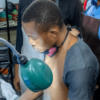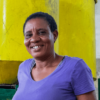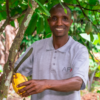MARKET SYSTEMS DEVELOPMENT
To implement economic development interventions across five agricultural value chains (aquaculture, cassava, cocoa, palm oil, and poultry) and MSMEs.
- Enabled food production and prosperity for farmers and entrepreneurs in key agricultural sectors by empowering them to increase their productivity and income in a sustainable manner.
- Sustained economic activities and gains with social capital and other conflict prevention and controlling mechanisms.
SUCCESS STORIES

“The findings from PIND’s study revealed some systemic constraints in the cocoa value chain. These include low productivity of farms arising from poor agricultural practices; predominance of older and ageing trees with low yields; absence of high-yielding seed varieties; inferior quality beans arising from poor post-harvest practices – leading to discount prices of Nigerian cocoa in the global market; and a lack of coordination among actors and functions within the value chain.”
read more

I used to operate a POS business at RIVTAF, Golf Estate, Port Harcourt, and I wanted to upgrade and own a fully-stocked supermarket. I approached PIND and took part in the Business Linkage Program. I connected with business service providers (BSPs) who advised me on how to set up a supermarket, including staff recruitment. Through the BSPs, I met vendors who supplied me with various items. I also met a BSP, who provided all the CCTV purchase/installations and the systems hardware installation.
They delivered and installed the accounting software for the supermarket sales/inventory management activity. They helped manage all these processes, which resulted in an increased client base and business stability. I am now comfortably running my business with minimal support. We serve the Golf Estate residents in Port Harcourt and its environs and offer home delivery service. My income has increased by over 65% and continues to grow.

In 2022, I saw a significant improvement in my business structure. Before, I had to be present to monitor operations in the business, or else things would fail to run smoothly. PIND helped me set up structures and employ the right staff to handle the daily running of the farm. I can now travel for training and workshops and to network with other service providers.
The standard of our training has improved, which is why more organizations and farmers want to work with us and even pay for our services. The market system approach developed by PIND has been the solution to all our problems. It benefits farmers and service providers because a reporting system makes us accountable to each other.
Before, smallholder poultry farmers in my community ran their businesses without proper structure and record keeping making it difficult for them to access finance. After training them, they have seen significant improvements, including increased profits. I want to thank PIND for reaching out to us at the grassroots level and giving us tools to improve our business, livelihood, and community.

After years as a primary school teacher, I resigned and became a full-home farmer. During the COVID-19 pandemic, I met with Ambassador Godwin Akandu from Rivers State, a service provider, who introduced me to PIND, and I received training on cultivating oil palm. I then started planning oil palm and other plants like okra, cassava, and groundnut. However, I needed more capital to set up a palm oil mill. PIND brought business consultants who trained us to manage our businesses and funds. I and some others in my community became beneficiaries of a CBN loan. We set up a palm oil mill in Ahoda West as a group, all thanks to PIND.
I am well-known in my community for farming. I am also a nursery operator. When people buy seeds from me, they contract me to help set up their farms. PIND’s training equipped me with the skills to become a farm manager and get paid for it. I have been doing so well that I manage farms in Rivers and Bayelsa States. PIND also trained me in peacebuilding and conflict management. When I consult in a community, I find out what structures are in place to manage conflicts to ensure that the farms I work on are safe and free from there. I am also very passionate about women’s empowerment and inclusion. On my farms, I endeavor to employ women and pay them a daily wage.

Before I met PIND, one of the significant challenges I faced was germinating the oil palm seeds. I usually get an output of 30% instead of 80% of the hybrid seeds I planted. In 2019, I met with PIND and learned how to get improved seedlings. PIND helped me get technicians who assisted with the heating process and connected me to customers. I have a better relationship with nursery operators across different states, including Akwa Ibom and Abia, and have increased my production and the number of seeds I sell. Thanks to PIND, I buy seeds from Presco, an agro-industrial company, at a discount. I have also provided jobs for more people in my community.
PIND put me on the map alongside other prominent players in the sector. PIND’s workshops have provided excellent resources for moving the oil palm sector forward. I appreciate PIND for all they do for farmers and nursery operators in the oil palm sector. Unlike my father, an agronomist, I am an engineer, so I had much to learn about the business I inherited from him. However, my partnership with PIND has helped make this transition smoother

PIND trained me as a nursery operator to identify oil palm seeds that are not viable for planning. From the nursery stage, I can now identify seedlings that would not be viable for planning and sort them out properly before taking them to the farm. The PIND approach has also exposed my organization to critical actors and stakeholders in the oil palm sector and provided us access to markets and innovative technologies such as mechanical harvesters. We were unaware of much of this innovation before meeting PIND. Now, we use these tools to improve our productivity.
More people in my community are confident about becoming oil palm farmers and nursery operators. The value chain has improved over the years thanks to PIND-facilitated training. The nursery operators teach farmers the best farming practices and support them in raising their seedlings. The farmers’ incomes have improved because their yield has improved.
More people now own cracking centers. PIND encouraged these by enabling access to capital to build oil palm mills. In this way, people who don’t own farms can make money. Livelihoods in my community have greatly improved as people now benefit more from the sector. PIND has made farmers in my community financially independent.

I was a teacher before I ventured into cocoa farming because of advice I received from my friends. They said there was money to be made from farming. I am part of a cooperative in my community, and we meet regularly to discuss farming and share knowledge. I first learned about PIND from a fellow farmer who attended a PIND-facilitated seminar in Delta State. He said participants were introduced to a new cocoa variety and taught how to plant it. He said, as a new farmer, it was better to adopt the new method.
I was skeptical because I was unsure if the new variety would thrive in our soil. Then I became interested when he told me the new seedlings would produce cocoa pods after two years. So, I visited his farm to see for myself. Then PIND held a workshop in my community, and we were taught different innovative farming techniques such as how to apply fertilizers, planning in three-by-three meter rows, proper pruning methods, etc. After planning the new varieties and using the techniques, my yield increased. PIND also linked us to big buyers who come to buy our produce right after harvest. Thanks to PIND, we are doing well and spreading the good news.

I heard about PIND in 2012, but my first encounter with the Foundation was a few years later while working with a partner NGO in the aquaculture program. I had just graduated from university and sought employment in the oil and gas industry. When I decided to start my small business, some of the challenges I faced were having a poor business structure, an inability to provide business services to other farmers, and providing paid training to farmers. The farmers didn’t want to work with me or pay for my services because I wasn’t a popular name in the sector. I then reached out to PIND, and with its support, I have seen an increase in my client base and visibility, especially in 2022.
After receiving training on best farming and business practices, I could adequately pass down my knowledge. The aquaculture farmers we have trained have changed their business structure and are seeing increased profits. I understand PIND’s vision of building best practices in the sector with the market systems approach to make the market work for low-income people. It’s about more than just making money but also about creating impact.
A few years ago, we met a farmer who had given up on the aquaculture sector and trained him on best practices. Even now that he is retired, his farm still runs smoothly and is a source of income for him. He has trained other farmers in his community who are also succeeding in aquaculture. I want PIND to continue teaching the market systems approach to more farmers, especially those affected by the economic crisis in the country. Showing them a working system would give hope to more farmers.

When PIND came to my community, Sagana, in Brass Local Government Area, to facilitate the installation of a solar refrigeration hub, we also received peacebuilding and conflict management training that helped us to resolve an existing inter-communal dispute. We were at war with a neighboring community, Igbematoro, over boundary lines.
An armed militant had initiated the conflict by setting up a flag and sign boards in some parts of our community, claiming it for Igbematoro. The situation was so bad that residents from each community stopped visiting the other. We did not fetch water or fish from their streams; they avoided ours too. The situation However, after PIND’s training, we initiated peace talks and resolved our issues. These days, cordial relations have resumed between both communities.









Am Oru partner mansion from bayelsa state Nigeria,am am into agro commodity trading palm oil edible, how this organization be of help to me to assess bigger market and other benefits
Hello,
Thanks for contacting us via our webpage. Do send an email with your inquiry to info@pindfoundation.org and it will be directed to our Oil Palm value chain team to respond accordingly.
Wishing you the very best,
PIND>